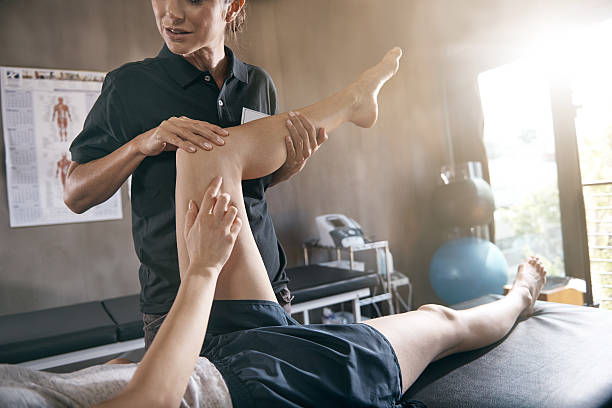Knee and back pain are the most common musculoskeletal conditions affecting millions worldwide. While these conditions can be caused by various factors, such as injury, poor posture, or overuse, they can both be extremely debilitating and impact your daily life.
Fortunately, many treatment options, including physiotherapy, are available to help manage these conditions. In this post, we will explore how Physiotherapy can help reduce pain, improve strength and flexibility, and prevent future injuries by using various techniques and exercises.
What Is Physiotherapy?
Physiotherapy, also known as physical therapy, is a healthcare profession that focuses on helping people recover from injury, illness, or disability. Physiotherapists are highly trained healthcare professionals who use various techniques and exercises to help patients improve their mobility, strength, and function.
Causes Of Knee Pain And Back Pain
Various factors, including injury, overuse, poor posture, and age-related degeneration, can cause knee and back pain. In many cases, these conditions result from a combination of factors, such as poor posture and overuse.
Causes of knee pain include:
Knee injuries, such as a torn ligament or meniscus
Arthritis
Patellofemoral pain syndrome
Osgood-Schlatter disease
Bursitis
Tendinitis
Common causes of back pain include:
Strained or sprained muscles or ligaments
Herniated or bulging discs
Arthritis
Osteoporosis
Sciatica
Scoliosis
How Physiotherapy Can Help
Physiotherapy can be highly effective for managing knee pain and physiotherapy for back pain in Parramatta, regardless of the underlying cause. Whether you are dealing with an acute injury or a chronic condition, physiotherapists can work with you to develop a treatment plan that addresses your unique needs and goals. Using a combination of techniques and exercises, such as manual therapy, therapeutic exercise, and pain management strategies, physiotherapy can help reduce pain, improve mobility, and prevent future injuries. With the guidance and support of a qualified physiotherapist for back pain in Parramatta, you can take an active role in your recovery and achieve long-term pain relief.
Benefits of physiotherapy for knee pain and back pain include:
Improved range of motion
Increased strength and flexibility
Reduced pain and inflammation
Improved balance and coordination
Reduced risk of future injury
Exercises For Knee Pain And Back Pain
In addition to techniques used by physiotherapists, exercise therapy is an essential part of physiotherapy for knee and back pain. Your physiotherapist will design a personalized exercise program to help improve your strength, flexibility, and range of motion in the affected area.
Some joint exercises for knee pain include:
Straight leg raises
Quadricep sets
Hamstring stretches
Wall slides
Mini-squats
Calf raises
Some joint exercises for back pain include:
Pelvic tilts
Bridge exercises
Cat-cow stretches
Knee-to-chest stretches
Hip stretches
Back extensions
Pain Management Techniques
If you are experiencing knee pain physiotherapy in Parramatta or back pain, consider seeking a physiotherapy clinic in your area. Physiotherapists specializing in treating knee and back pain can provide personalized care and support to help you manage your symptoms and improve your overall quality of life. With the right treatment plan, including manual therapy, therapeutic exercise, and pain management strategies, you can find relief from pain and discomfort and get back to doing the things you love.
The Benefits Of Physiotherapy For Knee Pain And Back Pain
Physiotherapy is a branch of healthcare that involves physical techniques and exercises to alleviate pain, improve movement, and restore function. It is often recommended as a first-line treatment for knee and back pain, as it can help patients avoid surgery or medication. Here are some of the benefits of physiotherapy for knee pain and back pain:
Reduced Pain
Physiotherapy can alleviate knee and back pain using techniques like massage, stretching, and exercise. These techniques enhance blood flow, decrease inflammation, and relieve muscle tension, resulting in pain relief.
Improved Mobility
Physiotherapy can improve mobility by increasing flexibility, strengthening muscles, and improving balance and coordination. It can help those who struggle with knee and back pain move around more comfortably and perform daily activities more easily.
Improved Function
Physiotherapy not only reduces pain and improves mobility but also enhances daily activities such as walking or climbing stairs, as well as sports and work-related tasks.
Reduced Risk Of Further Injury
Physiotherapy can prevent future injury by identifying and addressing underlying weaknesses or imbalances, such as posture or muscle issues that may cause knee or back pain.
Avoidance Of Surgery Or Medication
Physiotherapy can relieve pain and improve function, which may be a better option for patients who want to avoid the risks and side effects of surgery or medication.
Physiotherapy can be an effective and non-invasive way to manage knee and back pain. It offers a range of benefits for patients seeking to improve their quality of life and reduce their pain levels.
Final Thoughts
Physiotherapy is a personalized approach to the treatment of knee pain and back pain, which uses physical techniques and exercises to reduce pain, improve mobility, and restore function. Physiotherapists can design a customized treatment plan based on each patient’s specific needs and goals, which may include manual therapy, therapeutic exercise, and pain management strategies. By working with a qualified physiotherapist, patients can take an
active role in their recovery and achieve long-term pain relief. The benefits of physiotherapy for knee and back pain include reduced pain, improved mobility, improved function, and a reduced risk of future injury.

